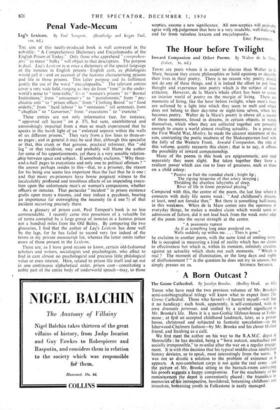The Hour before Twilight
Inward Companion and Other Poems. By Walter de Ia Mare. (Faber. 8s. 6d.) THERE are poets whom it is easier to discuss than Walter de la Mare, becauSe they create philosophies or hold opinions or describe their lives in their poetry. There is no reason why poetry should not do any of these things, and it is indeed the effort to put lived thought and experience into poetry which is the subject of most criticism. However, de la Mare's whole effort has been to create an interior world of poetry on the margin of living. There are moments of living, like the hour before twilight, when men's faces are softened by a light into which they seem to melt and which does not belong to their day-time or night-time selves, when life becomes poetry. Walter de la Mare's poetry is above all a record of these moments, found in dreams, in certain objects, in words themselves, which when they are collected together are powerful enough to create a world almost rivalling 'actuality. In a poem of the First World War, Motley, he made the clearest statement of this aim, contrasting the poetic madness of the Shakespearean fool with the folly of the Western Front, Inward Companion, the title of this volume, quietly reasserts this claim ; that is to say, it affirms the possibility of inward companionship.
Many of the poems in this book are epigrammatic, and read separately they seem slight. But taken together they have a resilient power which can rise to lines of greatness, such as these on a child asleep:
"Passive as fruit the rounded cheek ; bright lip ; The zig-zag turquoise of that artery straying ; Thridding the chartless labyrinths of sleep, River of life in fount perpetual playing,"
-Compared with this, the centre of the poem, the last line where it connects with daily life seems weak : " And childljood's dreams. at least, need not forsake thee." But there is something half-ironic in this weakaess. When de Ia Mare comes into the openness of everyday things, he makes a modest claim which would seem an admission of failure, did it not lead back from the weak outer edge of the poem into the secret strength at the centre:
" A passionate rapture As if at something long since pondered on, Wells suddenly up within me. ... Then is gone."
he exclaims in another poem, with the same kind of smiling irony. He is occupied in measuring a kind of reality which has no claims to effectiveness but which is, within its moment, infinitely creative, against an actuality which shuts out such moments. " Which is real ? The moment of illumination, or the long days and nights of disillusionment ? " is the question he does not try to answer, but






































 Previous page
Previous page